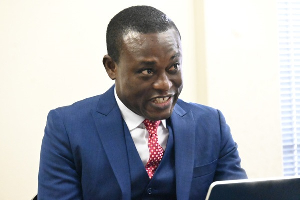Zimbabwe and Guinea have confirmed their readiness to participate in the African Peer Review Mechanism (APRM) in January 2020, Professor Eddy Maloka, Chief Executive Officer, APRM, has announced.
Speaking at the APRM’s first Regional Workshop on Sensitisation and Experience Sharing on Second Generation Review in Accra, Prof Maloka said following Ghana’s courageous decision to undergo the APRM review, some countries had committed to the review process.
The workshop, which was organised by the APRM National Governing Council, in collaboration with the Continental APRM Secretariat, brought together several African countries, development partners and non-state actors to facilitate peer learning on how APRM review processes were carried out with particular regard to the second review, and how recommendations in the first APRM reviews have been used to achieve better outcomes.
Prof Maloka said in the 16 years since its inception, the APRM had registered significant progress, with its member states increasing from six to 38 presently, with Botswana and The Gambia acceding at the 28th APR Forum of Heads of State and Government held on 9th February this year, in Addis Ababa, Ethiopia.
The APRM was established in 2003 by the New Partnership for Africa’s Development (NEPAD), Heads of State and Government Implementation Committee (HSGIC), as an instrument for African Union (AU) Member States to voluntarily self-monitor their governance performance.
The APRM is a voluntary arrangement amongst African states to systematically assess and review governance at Head of State peer level in order to promote political stability, accelerated sub-regional and continental economic integration, economic growth and sustainable development.
By acceding to the APRM, Member States agree to independently review their compliance with African and international governance commitments.
Prof Maloka said in constantly advancing the quest for better governance at all levels, as stated in the Base Document, the APRM encourages member states to regularly subject themselves to APRM reviews.
“This objective has been far-reaching. In essence, of all member states that have undergone the base review, only three countries - Kenya, Uganda and recently Mozambique - had undertaken their second-generation review,” he said.
“The APRM must urgently rise to the challenge of the sentiment of poor undertaking of the second-generation review, which was reinforced at different meetings, including the Panel Meeting in Egypt, where Panel members suggested follow up actions as a key priority.”
He said the APRM Continental Secretariat was resolutely committed to all the priorities identified.
“While we live with these challenges, we have taken steps to address them. The Continental Secretariat will ensure that we do not deviate from the identified priority areas, assured that if a second-generation review workshop is conducted and properly coordinated, we will create welcome multiplier effects in most of the member states,” he stated.
“We want to guarantee the sustainability of the APRM, but more importantly its relevance to the African Union and Member states.”
Prof Maloka said the APRM Continental Secretariat recognises the important role that leadership plays in ensuring the smooth implementation of the APRM second review process in member states.
He noted that the base reviews – or first Country Review reports – are indeed comprehensive, self- critical and high-quality reports, whose recommendations are insufficiently reported on and implemented. The Secretariat equally shares the view of certain countries that the methodology of the second-generation review needs further explanation.
Madam Shirley Ayorkor Botchwey, Minister of Foreign Affairs and Regional Integration urged all member states of the APRM to renew their commitment and interest in the process and rededicate themselves to its core values and objectives.
"Heads of State peer-Ievel review is a good tool to promote political stability, accelerated sub-regional and continental economic integration, economic growth and sustainable development.”
Prof Ibrahim Agboola Gambari, Chairman, APRM Panel, lauded Ghana for the premium it placed on the implementation of the APRM in the country.
Reverend Prof Emmanuel Asante, Chairman, APRM National Governing Council, said the Council would be making a request to the Government for it to undertake targeted review of certain sectors of the economy in the shortest possible time.
General News of Tuesday, 23 July 2019
Source: ghananewsagency.org
Zimbabwe and Guinea to participate in APRM
 L-R: Prof Emmanuel Asante, Shirley Ayorkor Botchwey, Prof Ibrahim Agboola Gambari & Prof Eddy Maloka
L-R: Prof Emmanuel Asante, Shirley Ayorkor Botchwey, Prof Ibrahim Agboola Gambari & Prof Eddy Maloka












